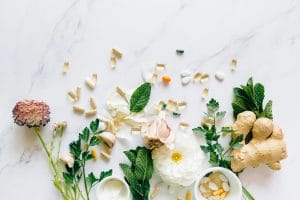Anxiety is something many of us live with every day. It shows up as racing thoughts, tight muscles, restless nights, and that unshakable feeling that something just isn’t right. While prescription medications can provide relief, more and more people are turning to natural remedies for anxiety—seeking options that ease the mind without unwanted side effects.
This growing interest in natural anxiety relief comes from a desire for safer, more holistic solutions—ones that blend science with age-old wisdom. From calming herbs and proven supplements to simple practices like mindfulness, breathing exercises, and better sleep habits, these remedies aim to support your body and mind in a more natural way.
In this guide, you’ll find a practical, research-backed approach to managing anxiety—without relying solely on medication. Whether you’re looking to feel calmer, sleep better, or regain emotional clarity, there are tools here to help you take your first steps toward balance and peace.
What is Anxiety?
Anxiety is more than just feeling nervous—it’s a persistent state of worry or fear that can interfere with daily life. It’s one of the most common mental health conditions globally, with millions of people experiencing it in different forms.
Common Types of Anxiety Disorders:
Generalized Anxiety Disorder (GAD): Ongoing, excessive worry about various aspects of life.
Social Anxiety Disorder: Intense fear or avoidance of social situations.
Panic Disorder: Sudden and repeated panic attacks with intense physical symptoms.
Specific Phobias: Irrational fears of specific objects or situations.
Symptoms Can Include:
Racing heart or chest tightness
Insomnia or restless sleep
Difficulty concentrating
Irritability or muscle tension
Digestive issues or nausea
Conventional treatments often include medication (like SSRIs or benzodiazepines) and cognitive behavioral therapy (CBT). While effective for many, some people experience side effects or seek alternatives that align with a more holistic approach to mental wellness.
20+ Proven Natural Remedies for Anxiety
Explore 30+ natural remedies for anxiety—herbs, supplements, and calming techniques backed by science. Reduce anxiety naturally and take control today.
Evidence-Based Natural Remedies for Anxiety

1. Ashwagandha for Anxiety
Ashwagandha is a powerful adaptogenic herb long used in Ayurvedic medicine to manage stress. It helps regulate cortisol levels, the body’s main stress hormone, making it one of the most effective natural remedies for anxiety—especially chronic stress-related forms. Research shows it improves resilience to both psychological and physical stress. Recommended dosage ranges from 300–600 mg per day, typically in extract or capsule form. Ashwagandha root powder or tea can also be consumed, but standardized extracts offer the most reliable results.
2. Chamomile Tea for Anxiety
Chamomile is one of the most well-known herbal supplements for anxiety, especially for mild symptoms and sleep-related issues. Clinical studies suggest chamomile extract can significantly reduce anxiety symptoms over time. Drinking chamomile tea 1–2 times daily has a calming effect, easing tension and promoting relaxation. Its gentle, sedative-like properties make it ideal before bed or during stressful moments. As a key player among natural remedies for anxiety, chamomile is a safe, widely accessible option for most people.
3. Valerian Root for Anxiety
Valerian root is a natural sedative known for improving sleep and easing restlessness. It works by increasing levels of GABA—a calming neurotransmitter in the brain. Often used as a sleep aid, valerian is also effective for nighttime anxiety or agitation. It’s commonly available in capsules, tinctures, or tea. While it’s generally safe for short-term use, long-term use should be monitored. Among natural remedies for anxiety, valerian is best reserved for evening support due to its drowsy effects.
4. Passionflower for Anxiety
Passionflower has been used both traditionally and in modern herbal medicine to relieve nervous tension. Scientific studies suggest it can reduce anxiety by boosting GABA levels in the brain, promoting calm without sedation. It’s often used as a tea or in tincture form and is safe for adults with mild to moderate anxiety. As one of the gentler natural remedies for anxiety, passionflower is excellent for reducing racing thoughts, especially during the day or before sleep.
5. Lavender for Anxiety
Lavender is well-documented for its calming, mood-stabilizing properties. It can be used in aromatherapy, teas, or supplements. Inhaling lavender essential oil has been shown to reduce cortisol levels and promote a sense of calm. Oral lavender oil capsules (such as Silexan) have demonstrated clinical efficacy in treating mild anxiety disorders. Whether applied topically or inhaled, lavender is one of the most researched and widely used natural remedies for anxiety, delivering consistent results for many.
6. Lemon Balm for Anxiety Treatment
Lemon balm (Melissa officinalis) is a calming herb traditionally used to reduce nervous tension and improve mood. It supports the nervous system and works well when combined with chamomile or valerian. Taken as a tea or tincture, lemon balm is ideal for managing social anxiety and restlessness. Studies suggest it helps improve attention and reduces anxiety in stressful situations. As part of a holistic plan, lemon balm is one of the most effective natural remedies for anxiety with minimal side effects.
7. Kava for Anxiety Symptoms
Kava is a potent herbal extract known for its anti-anxiety effects, particularly in short-term use. Clinical trials show kava can significantly reduce anxiety without affecting mental clarity. However, due to concerns about liver toxicity, it must be used with caution and under guidance. Typically consumed as a supplement or in ceremonial teas, kava is highly effective for generalized anxiety symptoms, especially social or performance-related stress. Despite FDA warnings, it remains a powerful option among natural remedies for anxiety when used responsibly.
Nutritional Supplements for Anxiety

While herbs play a vital role in holistic care, nutritional deficiencies are often overlooked contributors to anxiety. Addressing these gaps through supplements can complement other natural remedies for anxiety, improving overall mood stability, stress resilience, and cognitive clarity.
8. Magnesium for Anxiety Relief
Magnesium plays a crucial role in regulating the nervous system, and low levels are directly linked to heightened anxiety. It’s involved in GABA function and stress hormone control. Magnesium glycinate, citrate, and L-threonate are among the most effective forms for mental wellness. A daily intake of 200–400 mg is commonly recommended, depending on individual needs. As part of natural anxiety relief, magnesium supplements can ease muscle tension, calm nerves, and promote deeper sleep—key factors in managing chronic stress and anxiety.
9. L-theanine for Anxiety
Found naturally in green tea, L-theanine promotes relaxation without causing drowsiness. It works by increasing alpha brain wave activity and supporting dopamine and GABA levels—neurotransmitters involved in mood regulation. L-theanine is widely used in natural remedies for anxiety due to its gentle, fast-acting effects. Supplements typically range from 100–200 mg per dose and are safe for daily use. For individuals sensitive to stimulants or looking to stay focused under pressure, L-theanine offers calm clarity without sedation.
10. GABA Supplements for Anxiety
GABA (gamma-aminobutyric acid) is the brain’s primary inhibitory neurotransmitter, helping to reduce neuronal excitability and induce calm. While naturally produced in the body, GABA supplements aim to increase its levels to help combat anxiety. Research is mixed on its ability to cross the blood-brain barrier, but many users report noticeable benefits. It is commonly included in natural remedies for anxiety, particularly in nighttime formulations or anti-stress blends. Dosages vary from 100–750 mg and are generally safe for short-term use.
11. CBD Oil for Anxiety Research
CBD (cannabidiol) has emerged as one of the most studied natural anxiety relief options in recent years. Research shows that CBD can reduce symptoms of generalized anxiety disorder, social anxiety, and insomnia related to stress. It interacts with the endocannabinoid system and serotonin receptors to promote balance. Start with low doses (10–25 mg) and increase gradually. Legal status varies, but CBD derived from hemp is federally legal in many countries. As part of a holistic plan, CBD is one of the most promising natural remedies for anxiety backed by early but encouraging evidence.
12. Anxiety Relief Vitamins and Minerals
Certain vitamins and minerals are essential for emotional balance and are frequently incorporated into natural anxiety treatments.
B-Complex Vitamins: Support neurotransmitter production and reduce fatigue-related anxiety.
Vitamin D: Deficiency is linked to mood disorders, especially in winter months.
Zinc: Helps regulate the HPA axis (stress response system) and supports immune health.
Omega-3 Fatty Acids (EPA/DHA): Shown to reduce anxiety and improve mood, especially in people with inflammation-related stress. Fish oil and algae-based supplements offer clean, effective sources.
13. Probiotics for Gut-Brain Balance
Emerging research connects gut health to mental health, highlighting the gut-brain axis as a key player in mood regulation. Certain probiotic strains, such as Lactobacillus rhamnosus and Bifidobacterium longum, can reduce anxiety by lowering cortisol and modulating inflammation. Fermented foods like yogurt, kefir, sauerkraut, and kimchi also support microbiome health. As part of long-term natural remedies for anxiety, probiotics promote emotional balance, resilience to stress, and improved digestion—all of which contribute to calmer mental states.
Lifestyle Approaches to Anxiety Management

While supplements and herbs are powerful tools, lifestyle habits often serve as the foundation of long-term relief. The following natural remedies for anxiety focus on daily practices that calm the nervous system, build emotional resilience, and promote mental clarity.
14. Breathing Techniques for Anxiety
Breathing exercises are among the fastest natural remedies for anxiety. Techniques like box breathing (inhale 4, hold 4, exhale 4, hold 4) and the 4-7-8 method help calm the autonomic nervous system. Practicing for just 5–10 minutes daily can lower heart rate and reduce panic. Use these during high-stress moments or before bed to anchor your thoughts and regain control. Over time, breathwork improves emotional regulation and supports long-term anxiety management.
15. Meditation for Anxiety Management
Mindfulness meditation trains your mind to focus on the present moment, reducing racing thoughts and emotional reactivity. Studies show that daily practice lowers cortisol and anxiety levels. Free guided meditations are available through apps like Headspace, Calm, and Insight Timer. Even 10 minutes a day can make a difference. As one of the most accessible natural remedies for anxiety, mindfulness meditation is ideal for building long-term emotional resilience and mental clarity.
16. Yoga Poses for Anxiety
Yoga combines movement, breath, and awareness—making it highly effective for calming anxiety. Poses like child’s pose, legs-up-the-wall, and forward fold activate the parasympathetic nervous system. Beginners can start with 15-minute routines 3–4 times a week. Beyond flexibility and strength, yoga reduces muscle tension and quiets the mind. As part of a holistic routine, it’s one of the most physically engaging natural remedies for anxiety.
17. Exercise for Anxiety Relief
Regular exercise is a proven stress reliever. It boosts endorphins and reduces the body’s stress response. Aerobic activities like walking, running, cycling, or swimming are especially effective. Aim for at least 30 minutes of moderate movement, 4–5 days a week. Exercise not only improves mood and sleep but also builds long-term stress tolerance. For those seeking natural remedies for anxiety, movement is medicine—powerful, free, and science-backed.
18. Natural Stress Relief Through Diet
What you eat directly affects your mood and mental health. Anti-inflammatory foods like leafy greens, berries, fatty fish, and fermented foods reduce oxidative stress linked to anxiety. Avoid refined sugar and processed foods, which can trigger spikes in anxiety symptoms. Incorporate complex carbs, magnesium-rich foods, and omega-3s for better regulation. Meal planning for anxiety management focuses on balance, gut health, and steady energy—foundational elements in natural anxiety relief.
19. Aromatherapy for Anxiety
Aromatherapy uses essential oils to stimulate calming brain responses. Oils like lavender, bergamot, frankincense, and ylang-ylang have been studied for their anxiety-reducing properties. Diffuse them at home, apply diluted oils topically, or inhale directly. Try blends designed for social anxiety, sleep issues, or panic relief. As a sensory-based method, aromatherapy is one of the gentlest natural remedies for anxiety, particularly useful for quick mood resets and relaxation routines.
20. Grounding Techniques for Anxiety
Grounding techniques help redirect attention from anxious thoughts to the present moment. The 5-4-3-2-1 method—naming 5 things you see, 4 you feel, 3 you hear, 2 you smell, and 1 you taste—engages the senses. Physical grounding (touching cold water, holding an object) is also helpful. Use grounding during panic attacks or overstimulation. These are immediate, effective natural remedies for anxiety that require no tools—just awareness.
21. Cold Showers for Anxiety
Cold showers may seem unpleasant, but they stimulate the vagus nerve, which calms the fight-or-flight response. They also increase norepinephrine, a neurotransmitter linked to mood stability. Start with short bursts (30–60 seconds) at the end of a warm shower and build tolerance over time. This practice builds stress resilience and energy, offering a unique, physical approach to natural anxiety management.
22. Journaling for Anxiety Relief
Journaling helps organize anxious thoughts, track triggers, and create distance from negative thinking. Use gratitude lists, thought dumps, or prompts like “What am I feeling right now?” to gain clarity. Writing down your feelings allows for emotional processing and reduces mental clutter. As part of natural remedies for anxiety, journaling promotes self-awareness and cognitive calm—making it a powerful tool for both reflection and healing.
Special Considerations for Specific Groups
Not all anxiety remedies are one-size-fits-all. The following natural remedies for anxiety are adapted for specific needs—such as pregnancy, childhood, adolescence, menopause, and various anxiety disorders. These approaches emphasize safety, long-term support, and evidence-based care.
Natural Remedies for Anxiety During Pregnancy
Managing anxiety during pregnancy requires caution. Safe options include lavender aromatherapy, magnesium supplements, and gentle practices like prenatal yoga and mindfulness meditation. Herbal remedies such as chamomile and lemon balm may offer support but should be used only under medical supervision. Non-supplement methods—like breathing exercises, journaling, and warm baths—are often preferred. Before beginning any natural remedies for anxiety during pregnancy, always consult a healthcare provider to ensure maternal and fetal safety.
Natural Remedies for Anxiety in Children
Children benefit from simple, non-invasive natural remedies for anxiety. Options like bedtime chamomile tea (in small doses), lavender-scented stuffed toys, and child-friendly breathing apps can be very effective. Implement routines that encourage stability and comfort. Tools like creative play, mindfulness coloring, and physical grounding (e.g., holding a soft object) help redirect focus. Safety is key: avoid herbal supplements unless directed by a pediatrician, and always prioritize emotional connection and routine in anxiety support strategies.
Natural Remedies for Anxiety in Teens
Teen anxiety often arises from academic pressure, social comparison, and hormonal changes. Encourage practices like journaling, yoga, and deep breathing to promote self-regulation. Supplements like magnesium and L-theanine may be helpful if approved by a doctor. Aromatherapy with calming scents (lavender or bergamot) and digital detox routines also support teens. The best natural remedies for anxiety in adolescents pair emotional education with gentle lifestyle shifts and family support for sustainable anxiety relief.
Natural Remedies for Menopause Anxiety
Hormonal fluctuations during menopause can trigger anxiety. Herbal options like black cohosh, ashwagandha, and red clover may help balance mood and reduce stress. Lifestyle practices such as strength training, walking, and deep breathing exercises support hormonal regulation. Limiting caffeine and sugar also reduces symptom severity. The most effective natural remedies for anxiety during menopause combine herbal, nutritional, and lifestyle approaches, promoting both emotional and physical balance through this transition.
Natural Remedies for Social Anxiety
Social anxiety requires both internal calming and external practice. Chamomile tea, CBD oil (with professional guidance), and breathing techniques help reduce pre-event tension. Visualization and journaling can prepare the mind, while gradual social exposure builds confidence. Pairing calming remedies with cognitive exercises can significantly reduce fear of judgment. These natural remedies for anxiety are particularly useful before public speaking, social gatherings, or work events where fear of performance is common.
Natural Remedies for Panic Attacks
Panic attacks call for quick, grounded interventions. Fast-acting methods like the 5-4-3-2-1 grounding technique, cold water splashes, or inhaling peppermint oil can quickly interrupt panic spirals. Breathing exercises such as the 4-7-8 method help slow the heart rate. Long-term support includes magnesium supplementation and cognitive journaling. As acute episodes subside, these natural remedies for anxiety help individuals regain control and reduce panic frequency over time.
Natural Remedies for Generalized Anxiety Disorder (GAD)
GAD involves persistent, excessive worry and often requires a long-term management plan. Ashwagandha, L-theanine, and omega-3s are well-researched supplements that may ease chronic symptoms. Pair these with mindfulness-based stress reduction (MBSR), daily journaling, and consistent sleep hygiene. Behavioral lifestyle changes—such as limiting screen time and setting worry boundaries—also support mental clarity. These holistic natural remedies for anxiety provide ongoing, practical support for individuals living with GAD.
Implementing Natural Anxiety Treatment Plans

Creating a personalized, sustainable strategy is key to making natural remedies for anxiety work long term. Here’s how to thoughtfully combine supplements, habits, and mindfulness-based therapies while knowing when to seek expert help.
How to Create a Holistic Anxiety Approach
A holistic plan combines several natural remedies for anxiety tailored to your needs. Start with one or two approaches (e.g., chamomile tea + journaling) and build gradually. Incorporate routines—such as breathing exercises in the morning or magnesium at night—to anchor your day. Track symptoms, mood, and triggers to assess what works. Consistency is more important than intensity. Holistic approaches often include nutrition, sleep, movement, herbs, and mindfulness for lasting anxiety relief.
When to Use Natural Anxiety Supplements
Supplements like L-theanine, CBD, or ashwagandha can be used for acute anxiety (e.g., before presentations) or as daily support for chronic anxiety. Timing matters: magnesium may work best before bed, while L-theanine or B-complex is ideal in the morning. Always integrate supplements with other practices (like mindfulness or exercise) rather than using them as stand-alone solutions. These natural remedies for anxiety work best when part of a broader lifestyle strategy—not a quick fix.
Safety and Side Effects of Herbal Anxiety Remedies
While generally safe, some herbal anxiety remedies can interact with medications or cause side effects. Kava may affect liver health; valerian can cause drowsiness; and some essential oils may trigger skin irritation. Always research dosage guidelines and consult a healthcare provider—especially if pregnant, nursing, or managing other health conditions. Monitor how your body responds to each remedy. Like any treatment, natural remedies for anxiety require care, consistency, and informed usage.
When to Seek Professional Help
If anxiety interferes with your job, relationships, or daily functioning, it’s time to consult a professional. Persistent panic attacks, insomnia, or worsening symptoms may signal that natural remedies for anxiety alone aren’t enough. Therapists, integrative physicians, and psychiatrists can help you combine natural and conventional treatments safely. Cognitive Behavioral Therapy (CBT), medication, or trauma-informed care may be necessary. Combining professional guidance with holistic care often leads to the most effective, well-rounded recovery.
Frequently Asked Questions About Natural Remedies for Anxiety
1. What is the most effective natural remedy for anxiety?
There’s no one-size-fits-all answer, but some of the most effective natural remedies for anxiety include ashwagandha, L-theanine, magnesium, CBD oil, and mindfulness-based meditation. Their effectiveness often depends on the individual and the type of anxiety experienced. Many people find that a combination of herbs, supplements, and lifestyle changes works better than using any single remedy alone.
2. Can you treat anxiety without medication?
Yes, many people manage anxiety successfully using natural remedies for anxiety such as breathing techniques, yoga, herbal supplements, and dietary changes. However, results vary. For some, natural approaches provide complete relief, while others may still benefit from therapy or prescription medication. The key is finding a sustainable plan that works for your body, mind, and lifestyle.
3. Are there risks with herbal anxiety supplements?
While many herbal anxiety remedies are safe, they can still cause side effects or interact with medications. For example, kava may affect liver function, and valerian may cause drowsiness or dizziness. Always follow dosage guidelines and consult your healthcare provider before starting herbal supplements—especially if you’re taking antidepressants, are pregnant, or have a chronic condition.
4. Which vitamins help most with anxiety?
Key vitamins that support natural anxiety relief include:
B-complex vitamins – Support brain chemistry and reduce stress.
Vitamin D – Helps regulate mood, especially in those with deficiencies.
Magnesium – Calms the nervous system and improves sleep.
Omega-3 fatty acids (EPA/DHA) – Lower inflammation and reduce anxiety symptoms.
These nutrients play vital roles in neurotransmitter function and hormonal balance.
5. Do natural remedies work for long-term anxiety?
Yes—when used consistently and as part of a holistic plan, many natural remedies for anxiety offer long-term support. Daily habits like journaling, mindfulness, proper sleep, exercise, and nutritional support help retrain the brain’s stress response. However, long-term success often involves lifestyle changes, not just supplements. Natural solutions may also complement therapy for deeper emotional healing.
6. Is it safe to use these with antidepressants?
Some natural anxiety supplements may be safely combined with antidepressants, but others can interact negatively. For example, St. John’s Wort is known to interfere with many medications, while CBD, magnesium, or L-theanine are often used alongside SSRIs under supervision. Always consult your doctor before mixing any supplement with prescribed medication to avoid adverse effects or reduced effectiveness
Final Thoughts
Managing anxiety doesn’t have to start with a pill. As this guide shows, there are many natural remedies for anxiety that can make a real difference—without harsh side effects or dependency. Whether it’s herbal support like chamomile or ashwagandha, or daily habits like journaling and deep breathing, relief often starts with small, consistent steps.
Remember, every body is different. What works for one person may not work for another—so stay open, patient, and focused on building a personalized plan. And as always, consult a qualified healthcare provider before starting any new supplement or remedy.
- 7+ Proven Home Remedies for Sneezing That Actually Work - August 2, 2025
- 10 Natural Remedies for Eczema Relief - June 5, 2025
- How to Clean Pool Table Felt Without Damaging the Surface - May 9, 2025

